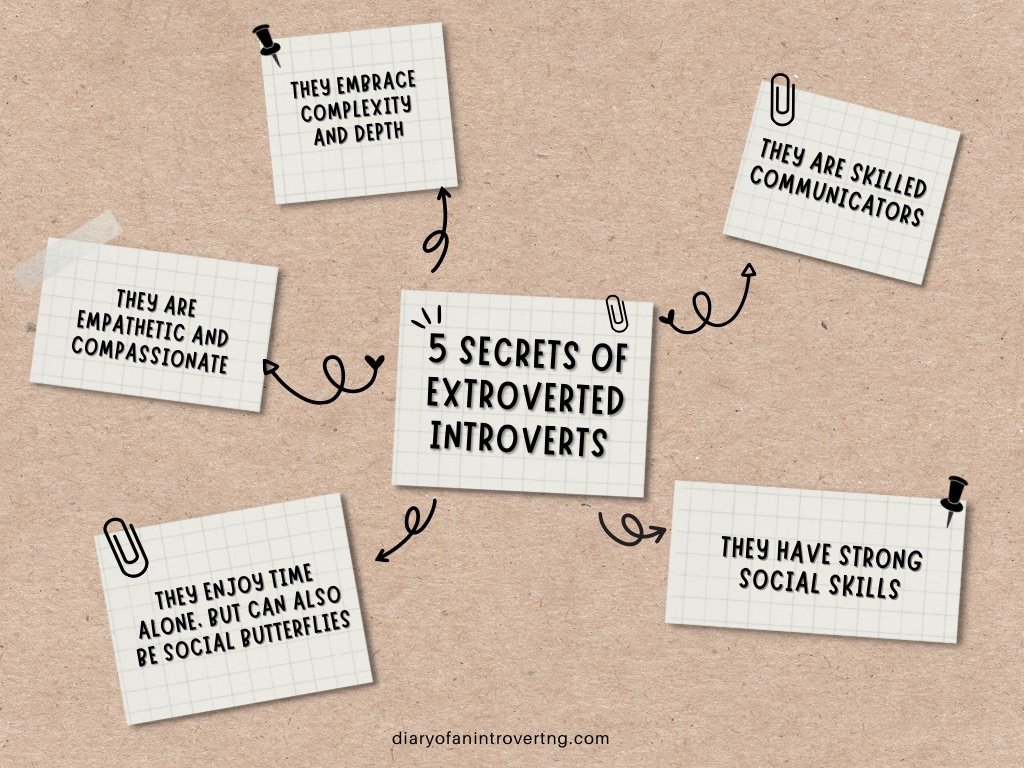5 Secrets of Extroverted Introverts: They're Easy to See!
Photo by Boxed Water Is Better on Unsplash
Have you ever met someone who seems outgoing and social, but also values alone time and introspection?
Meet the "extroverted introvert" – a term used to describe individuals who possess traits of both an extrovert and an introvert.
While extroverts are energized by socializing and being around people, introverts recharge by spending time alone.
Extroverted introverts, on the other hand, have the ability to navigate social situations with ease, while also needing time to themselves to recharge their batteries.
In this article, we'll explore the five secrets of extroverted introverts and the extroverted introvert meaning. More so, how they balance their social and introspective sides to form a unique and intriguing personality type.
By understanding these five secrets and the introvert and extrovert meaning, we can learn more about what makes extroverted introverts so unique and intriguing.
Before we begin…
Know that many people are not strictly introverted or extroverted.
The differences between extroverts and introverts have long been a topic of discussion, and extroverted introverts blur the lines between the two.
Many individuals possess a unique ability to shift from being introverted to extroverted, depending on the situation. They can be introspective and reserved when needed, but also outgoing and sociable when the occasion calls for it.
The thing about extroverted introversion (also known as social introversion) is that there's no one-size-fits-all definition for this personality type.
Since the introvert and extrovert meanings are far apart on the personality scale, the extroverted introverted definition can meet anywhere in the middle.
So, what is an extroverted introvert? It's more like a spectrum of behaviors and tendencies that can differ from person to person.
For instance, some introverted extroverts might prefer spending most of their time alone, while others might enjoy socializing more.
It's really important to remember that everyone is unique, and there's no right or wrong way to be an extroverted introvert.
Basically, the extrovert-introvert meaning is just a way to describe people who show a mix of both extroverted and introverted qualities in their personalities. It’s not a clearly defined term, but a character trait that people showcase.
Below are the 5 secrets of extroverted introverts that are ironically easy to see.
Secret #1: They Have Strong Social Skills.
Extroverted introverts have a complex personality, as they draw energy from both spending time alone and being around others.
They can have a small group of close friends and family with whom they feel comfortable, but can also thrive in larger social gatherings.
While they may seem reserved at first, they have a natural charisma that can quickly draw people toward them.
What is an extrovert-introvert? This is an individual with a blend of qualities that make them intriguing and captivating . Their ability to seamlessly move between introversion and extroversion can make them excellent communicators, leaders, and team players.
So how do they do it? How do extroverted introverts manage to be so skilled in social situations despite their introverted nature?
One of their secrets is their ability to listen and observe.
Because they spend a lot of time reflecting and introspecting, they have a keen awareness of their own thoughts and emotions, as well as the thoughts and emotions of those around them.
This allows them to be good listeners, and they can often pick up on subtleties in conversation that others might miss. This enables them to connect with people on a deeper level and build strong relationships.
Another strength of extroverted introverts is their ability to balance social interaction with alone time. While they may enjoy being around people and engaging in social activities, they also need time to themselves to recharge.
This means that when they are in social situations, they are fully present and engaged, but they also know when it's time to take a step back and recharge their batteries. This level of self-awareness and self-care is what enables them to maintain their social skills over the long term.
Because an extravert introvert is introspective and thoughtful, they are often able to connect with people on a deep level. They value the complexity and nuance of relationships, which helps them forge strong bonds with others, even if they don't always feel comfortable in large social gatherings.
You’ll spot an extroverted introvert in real-life situations, such as:
Networking events: Many individuals fit the extroverted introvert definition because they embrace active listening and love engaging in meaningful conversations. Who knows, attending these events could even help them land better job opportunities.
Team-building activities: People who are both an introvert and extrovert and display extroverted introversion, enjoy team-building activities because it gives them a chance to connect with others in a more laid-back environment. With their empathy and compassion, they're able to understand the strengths and weaknesses of their teammates and provide support and encouragement.
Social gatherings: Although extroverted introverts may feel uncomfortable in large social gatherings, they are often able to connect with others in more intimate settings. They may engage in meaningful conversations with others, share their hobbies and interests, or simply listen to others and offer support and advice.
Online communities: Many introvert, extrovert, and ambivert individuals are active in online communities. But mostly, extroverted introverts use their social skills to connect with others who share similar interests or experiences, and may offer advice or support to those who need it.
Secret #2: They Enjoy Time Alone, But Can Also Be Social Butterflies.
When comparing the extroverted vs introverted folks, it’s necessary to know that they both value both alone time and social interaction in different capacities.
However, those that match the extroverted and introverted meanings enjoy it equally.
On the one hand, they need alone time to recharge their batteries and process their thoughts and emotions. On the other hand, they enjoy being social and connecting with others. This balance can be challenging to maintain, but it is essential to their well-being.
For extroverted introverts, alone time is not just a preference, it is a necessity. They use this time to reflect on their thoughts and emotions, and focus on their personal goals and interests. Without this alone time, they may feel drained and overwhelmed, which can lead to stress and anxiety.
However, while alone time is important to extroverted introverts, they also crave social interaction. They enjoy connecting with others and building meaningful relationships.
One way extroverted introverts find balance is by setting boundaries. They may limit the amount of social interaction they have in a day or week, or they may schedule alone time into their routine.
They also tend to be selective about the types of social interactions they engage in, choosing activities that align with their interests and values.
That being said, extroverted introverts value authenticity in their social interactions. They may prefer deep conversations over small talk, and may seek out associations with people who share a unique connection.
This allows them to bond with others, which can be more fulfilling and energizing than superficial social interactions.
You’ll spot an extroverted introvert in real-life situations, doing:
Taking breaks during social events: Those that are introverted and extroverted may attend social events, but they often need to take breaks to recharge. They might step outside for some fresh air or find a quiet corner to reflect and recharge before returning to the social event.
Engaging in solo hobbies: An introverted extrovert may enjoy solo hobbies such as reading, painting, or hiking. These activities allow them to have alone time while also pursuing their interests and passions.
Setting boundaries: Extroverted introverts may set boundaries to balance their social and alone time. They may limit social outings or schedule specific alone time into their routine.
Choosing meaningful social interactions: Extroverted introverts may prioritize meaningful social interactions over superficial ones. They may choose to spend time with close friends or family members who understand their need for alone time than someone they just met.
Finding a balance in relationships: Extroverted introverts may find balance in their relationships by communicating their need for alone time with their partners or friends. They may also find partners who share their values and interests, allowing them to connect on a deeper level.
Secret #3: They Are Empathetic and Compassionate
Outgoing introverts are often highly empathetic and compassionate individuals. While they may appear reserved or introverted on the outside, they have a deep understanding of others' emotions and are sensitive to the needs of those around them.
One reason extroverted introverts may be highly empathetic is that they spend a lot of time observing and reflecting on their own emotions. They have a deep understanding of their own emotional experiences, which allows them to relate to others and understand their emotions as well.
Those who are socially introverted are also highly empathetic because they value deep and meaningful relationships.
They often seek out relationships with people who share their values and interests, which allows them to connect with others on a deeper level. Through these relationships, they develop a strong sense of empathy and compassion for others.
Extroverted introverts are often attuned to the needs of those around them. They may be more likely to notice when someone is struggling or in need of support, and they are often willing to offer their help and support in meaningful ways.
This happens because they have a strong sense of social responsibility. They may be motivated to help others and make a positive impact in their community. This drives them to be more empathetic and compassionate toward others.
If you spot someone with these traits, they might be social introverts:
Active listening: A sociable introvert is often a skilled listener. They may ask thoughtful questions, offer support, and validate the emotions of those they are speaking with.
Supporting others: Extroverted introverts may use their compassion to help others in several ways. They may offer advice, solve problems, or simply offer a listening ear.
Volunteer work: Those with both extrovert and introvert tendencies may engage in volunteer work that aligns with their values and interests. This allows them to connect with others who share similar passions while making a positive impact in their community.
Emotional intelligence: Extroverted introverts often have a high level of emotional intelligence, which allows them to connect with others on a deeper level. They may be able to sense the emotions of others and respond in a supportive and compassionate way.
Liking this article? Join our Introvert Club→
Secret #4: They Are Skilled Communicators.
"Reserved extroverts" are skilled communicators, both verbally and non-verbally. Despite their introverted nature, they are able to navigate social situations with ease. More so, they often excel at communication.
This makes them an interesting mix for people who want to interact with someone who possesses qualities of both an extrovert or introvert.
As noted earlier, friendly introverts are able to balance their need for alone time with their desire for social interaction. It’s one reason they tend to be skilled communicators.
This balance allows the introvert or extrovert in them to recharge and come back to social situations with a fresh perspective, and the energy to engage in meaningful communication.
Since extroverted introverts are often observant and attuned to the emotions and needs of others, they can respond thoughtfully and empathetically.
Socially adept introverts tend to use their skills to express themselves in a way that fosters connection and understanding, whether they are communicating verbally or non-verbally.
They may use eye contact, facial expressions, and body language to convey empathy, understanding, and support.
This can help others feel seen and heard, even without speaking.
These reflective and introspective individuals spend time reflecting on their own thoughts and emotions, which allows them to communicate with authenticity and vulnerability.
Therefore, they are more relatable and approachable in social situations.
Some real-life examples of extroverted introverts communicating that are easy to spot:
Conflict Resolution: Introvert-extroverts are skilled at resolving conflicts. They listen to all parties involved, mediate disagreements, and help find common ground. Their ability to empathize with multiple perspectives helps to de-escalate tense situations and bring people together.
Storytelling: Extroverted introverts use storytelling to connect with others on a deeper level. They are able to share personal experiences in a way that engages and inspires others. This can be especially powerful when discussing shared interests or experiences.
Emotional Support: These individuals also provide emotional support to others through their communication skills. They may use active listening, non-judgmental language, and empathy to help others work through difficult emotions or experiences. Their ability to create a safe and supportive space helps foster deeper connections.
Sharing Personal Stories: Extroverted introverts often are comfortable opening up to others and being vulnerable. This tends to create a deeper sense of connection and trust.
Group Facilitation: Bold introverts may also use their communication skills to facilitate group discussions and activities. They can help bring diverse perspectives together and ensure everyone has a chance to contribute and be heard.
Secret #5: They Embrace Complexity and Depth.
People who have extroverted or introverted traits tend to appreciate complexity and depth in their relationships and conversations.
They often enjoy exploring a topic or idea in detail and are skilled at drawing out the complexities and nuances of a conversation. This is because they are willing to invest time and energy into building relationships with others.
In relationships, extroverted introverts tend to prioritize quality over quantity. They may have a smaller circle of close friends, and will inevitably choose deep, meaningful connections with these individuals over superficial ones.
In conversations, extroverted introverts tend to ask thoughtful questions to understand multiple perspectives. They also have a knack for understanding and empathizing with the unique challenges and experiences of their loved ones.
They enjoy exploring abstract ideas or philosophical questions, and are skilled at teasing out the fine variations of a discussion.
Those who match the extrovert-introvert meaning also enjoy exploring the complexities of their own inner worlds. They spend time reflecting on their thoughts, feelings, and experiences in order to gain a deeper understanding of themselves and their place in the world.
This introspective approach can help them to cultivate a sense of self-awareness and authenticity in their relationships and interactions with others.
You’ll observe extraverted introverted folks in areas such as:
Thought-provoking conversations: In social situations, extroverted introverts may be drawn to individuals who exhibit a depth of character and a willingness to engage in meaningful conversations. They may actively seek out discussions on topics such as philosophy, politics, or art, and enjoy exploring different viewpoints and perspectives.
Drawn to different cultures: An introvert with extrovert tendencies may also appreciate the complexity and depth of different cultures and worldviews. They may enjoy learning about the customs and traditions of different societies, and may seek out opportunities to travel and experience new places and ways of life. This appreciation for diversity can help them to build connections with individuals from different backgrounds and gain a deeper understanding of the world around them.
Emotionally-vulnerable relationships: In their personal relationships, extroverted introverts tend to value honesty and authenticity. They may seek out partners and friends who are willing to share their deepest thoughts and feelings, and who are open to exploring the complexities of the human experience. They may also be drawn to individuals who value introspection and self-reflection, and who are willing to engage in conversations about personal growth and development.
FAQs
What is an extroverted introvert?
An extroverted introvert is someone who exhibits traits of both introversion and extroversion. They may enjoy social interactions but also need time alone to recharge.
What is an introvert and extrovert?
Introverts and extroverts are personality types on a spectrum. Introverts tend to be more reserved and introspective, while extroverts are more outgoing and energized by social interaction.
How do I know if I am an extroverted introvert?
You may be an extroverted introvert if you enjoy socializing but also need time alone to recharge. You may also have strong communication skills but feel drained after social interactions.
What are the 4 types of introverts?
The four types of introverts are social, thinking, anxious, and restrained. Social introverts enjoy socializing but need time alone. Thinking introverts are introspective and reflective. Anxious introverts are shy and self-conscious. Restrained introverts avoid stimulation and excitement.
What is the most extroverted introvert?
The most extroverted introvert would be someone who exhibits strong communication skills and enjoys socializing, but also needs time alone to recharge and may experience social exhaustion. This is usually the ISFJ personality.
Over to you…
Are you an extroverted introvert? Being both introverted and extroverted is extremely cool. This mix of traits allows you to be amazing at connecting with others, while balancing it with alone time. It's pretty impressive, and there's a lot that others can learn from these skills. Kindly drop your thoughts below or share with a friendly introvert you know.
Live Your Best Quiet Life
Get the Am I Too Quiet? book →














